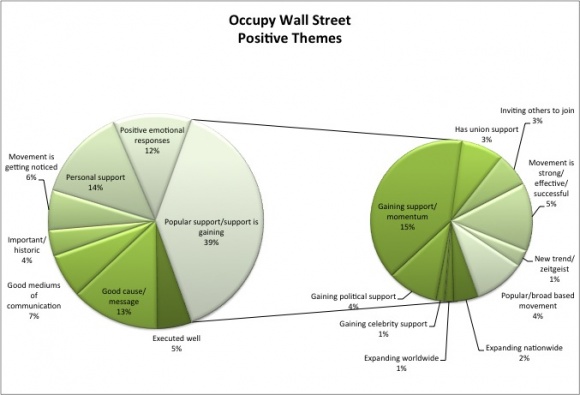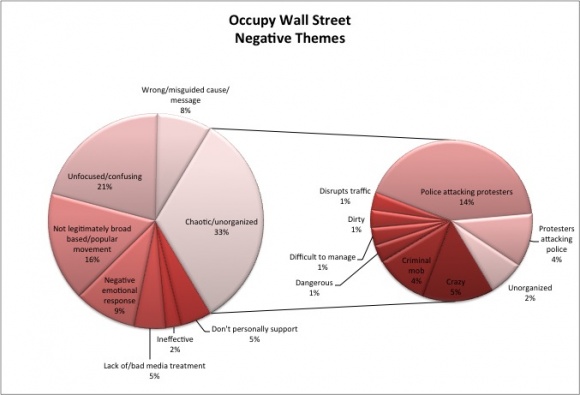#Occupy Social Media Analytics
20 October 2011
I reside three blocks from Zuccotti Park, where “Occupy Wall Street” (OWS) has planted the movement firmly in New York City’s Financial District and, in just four weeks, has sparked a global social dialogue echoing societal malaise worldwide.
In speaking with colleagues and friends here in Manhattan and across the country who, for the most part, see only sensationalized coverage of the local and global events on the news, I hear many reflect a biased impression that OWS represents only the fringe elements of society. To be sure, most all causes—from national politics to the global environment— attract their fair share of fringe, even extremist elements. But as those of us in close proximity to Zuccotti Park follow what has become a true social media phenomenon— as much a global physical expression as a social media-driven event—we know this is far from the truth.
Support for OWS has attracted a variety of support, from former Wall Street insiders and others recently “coined” in a New Yorker magazine article as The Ten Unlikely Occupy Wall Street Supporters. Among them are Ben Bernanke, Suze Orman, Vikram Pandit and Dr. Jeffrey Sachs.
Curious about what new social insights we might learn and share, we used NetBase Workbench to pull all historical data from the day following global October 15th events—430,000 sound bites from all sources— to map a sampling of positive and negative emotions and help us relate other sides of the story as it unfolds. FYI: In the midst of writing this post, sound bites grew to 530,000 as the OWS released a draft of its platform and issued a call for a July 4th national convention.

Occupy Wall Street Social Media Theme Mapping – Positive Emotions as of October 16, 2011
Net sentiment for OWS continues to trend positively. But rather than examining all the emotions that surround the vast number of socio-economic and political issues raised by OWS—a self-proclaimed consensus based movement—and its supporters, we wanted to look at what stories this vocal online social movement might convey as support grows in popularity
Here are sound bites of what we feel might show nascent stories with important implications:
Popular Broad Based Movement: There is increasing evidence of broad support across social strata.
Occupy Wall Street gains momentum! The American people are fed up and demanding accountability!
(source)
(source)
Occupy Wall Street is gaining momentum. We are the 99% is a winning meme. & Congress passes a trade deal to further enrich the plutocrats.
(source)
(source)
New Trend/Zeitgeist – Historic: An unparalleled viral social movement may be taking place in the U.S.
Tremendously impressed with Tim Bray’s essay on Occupy Wall Street. (source)
Occupy Wall Street is the most important thing in the world right now.By Naiomi Klein on 11 October 2011 for Truthout – .
(source)
(source)
David Nichols tweeted: The thing is, we can not separate what is happening in the economy from business because we are headed off a cliff and the only way to not go crashing into the ground is to realize what caused this economic downturn – and more importantly – what we can do to change things. Occupy Wall Street is the most important thing to happen in my lifetime.
(source)
(source)
Use of Social Medium: Like the Arab Spring, the medium is the message.
Very impressed by Occupy Wall Street’s use of Wikipedia.Occupy Wall Street – Wikipedia, the free encyclopedia en.wikipedia.org . Occupy Wall Street is an ongoing demonstration3opposing corrupt corporate influence in U.S. politics, the influence of money and corporations on democracy4 and a lack of legal and political repercussions for the global financial crisis.
(Source)
(Source)
Most disruptions will also be avoided. The message takes some time to gel, and even then stays evolving. So far the Occupy Wall Street movement has exhibited an amazing mastery of social media. Actions are piped out. Voices come streaming back in.
(source)
(source)
Changes in volume, sentiment and emotion should be measured over time. Conversations and mentions on social media channels are often harbingers of new trends, so ad hoc queries should be added as needed when new issues come up. Occupy Wall Street is a good example. The protest did not receive widespread media coverage until almost a week after it started, but the social media universe was filled with chatter from the get-go. After two weeks, there were more online conversations about it than any of the GOP candidates.
(source)
(source)

Occupy Wall Street Social Media Theme Mapping – Negative Emotions as of October 16, 2011
Negative themes reflect complaints that OWS is unorganized, chaotic and confrontational. Other informative insights surface, as well, and include pervasive criticism that OWS is without focus or agenda. The General Assembly of this consensus-built group clearly has listened with today’s publication of its platform.
Misguided, Unfocussed, Confusing: Erin Burnett was blasted for her mockery of OWS
Occupy Wall Street is absolutely insipid. I’ve never in my life met anyone interested in protesting but for reasons OTHER than serving anything but their own egos. Her job is to get younger women to watch CNN.
(source)
(source)
…pointedly inattentive lately you may have noticed the minor kerfuffle happening stateside on Wall Street. Initially given no attention at all by domestic media, and garnering more coverage from British institutions like The Guardian , it has since crossed the country and forced a response from political leaders of all stripes. The Occupy Wall Street movement is difficult to summarise. But in an attempt to make this post neither completely redundant or vastly misinformed, we’ve assembled a potted tour of some of the stories surrounding the protests. New Yorker making some pretty decent sense out of the uncertain data that is available regarding the protests.
(source)
(source)
Not Legitimately Broad-Based/Popular Social Movement
Latest Breaking News Rep. Peter King Fears Occupy Wall Street’s Policy Influence Source: Internatinal Business Times . Peter King Fears Occupy Wall Street’s Policy Influence . Congressman Peter King (R-N.Y.) is afraid that the growing number of Occupy Wall Street protesters, along with the mounting media coverage of the movement, may end up shaping U.S. government policy like the anti-war protesters did in the 1960s and 1970s. King was speaking on Laura Ingraham’s radio show on Friday when he blasted the protesters as “ragtag mobs” and said he remembers a 1960s left-wing movement that took to the streets and caused policy changes after the media “glorified” the protesters.
(source)
(source)
Yes, how dare those not-rich people think they have rights! – Romney: Occupy Wall Street Is ‘Dangerous…Class Warfare’
(source)
(source)
Lack Of/Negative Media Treatment
NY Times coverage of Occupy Wall Street continues to be underwhelming. I view it as inadequate by any objective standard.
(source)
(source)
Last week he interviewed Chris Hedges, a Pulitzer-winning former New York Times reporter turned left-wing gadfly, on the Occupy Wall Street phenomenon. It is true that Mr. Hedges frequently leans toward the apocalypse. First a contemptuous Mr. O’Leary dismissed the Occupy Wall Street protests out of hand. When Mr. Hedges explained some of the protesters’ grievances, Mr. O’Leary responded by calling him a “left-wing nut bar.” An infuriated Mr. Hedges shot back that he expected from the CBC a discussion of the issues and not character assassination, and that “This sounds like Fox News.”
(source)
(source)
Insights
• Robust social-cause insights derived from social media analytics provide important implications for market research firms, corporate market researchers and brand insight innovators.
• Social scientists now possess social media baselines from which to measure popular sentiment, shifting attitudes, perception and change.
• The potential for averting a loss in brand equity not only is the domain of political campaigns but also can prove an effective tool for brands to grow competitive advantage.
• The emotion value of minority insights should not be discounted; you may be spotting a new trend. Delve deeper.
• What you see may not often be what you get—be it on TV news or in social media—so being provided reliable analytics along with insights is required to help turn around media impression and its coverage of your brand.
• Social scientists now possess social media baselines from which to measure popular sentiment, shifting attitudes, perception and change.
• The potential for averting a loss in brand equity not only is the domain of political campaigns but also can prove an effective tool for brands to grow competitive advantage.
• The emotion value of minority insights should not be discounted; you may be spotting a new trend. Delve deeper.
• What you see may not often be what you get—be it on TV news or in social media—so being provided reliable analytics along with insights is required to help turn around media impression and its coverage of your brand.
Source: Localspeak.com
No comments:
Post a Comment